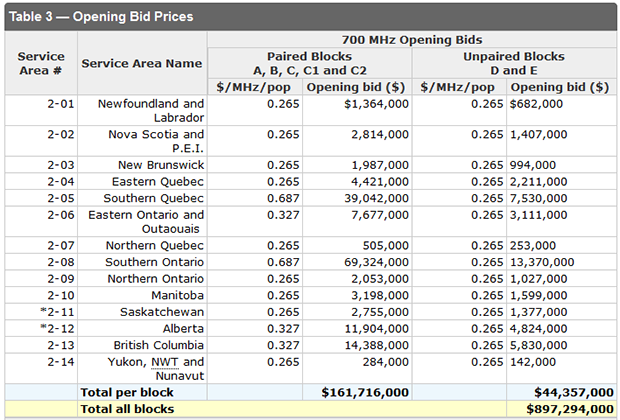 Despite yesterday’s surprise that WIND Mobile had withdrawn from the 700MHz spectrum auction, the bidding for the new spectrum licenses, including four prime blocks of spectrum, in 14 Canadian regions got underway today.
Despite yesterday’s surprise that WIND Mobile had withdrawn from the 700MHz spectrum auction, the bidding for the new spectrum licenses, including four prime blocks of spectrum, in 14 Canadian regions got underway today.
The 700MHz spectrum has been deemed particularly valuable because of its ability to travel further and through buildings more easily, thereby requiring less infrastructure. It it also the same band used by both AT&T and Verizon in the U.S. so sourcing new devices that support the new spectrum will be easier.
Of the original 15 entries, five, including WIND Mobile, withdrew before the auction started, leaving the following 10 to fight it out:
- Bell Mobility Inc.
- Bragg Communications Incorporated (Eastlink)
- Feenix Wireless Inc.
- MTS Inc.
- Novus Wireless Inc.
- Rogers Communications Partnership
- Saskatchewan Telecommunications (SaskTel)
- TBayTel
- TELUS Communications Company
- Vidéotron s.e.n.c.
Opening bids are listed in the table below. Right off the bat, the auction could net the Canadian government nearly CA$1 billion but it is expected that bids will push that higher. How much higher remains to be seen though. The government may have to settle for less given that its plan to attract Canada’s new players as well as foreign players has effectively failed, leaving the incumbents and regional players to fight it out.

The auction is expected to run over several weeks but there is no clear end as it will depend on how much bidding activity there is. The Canadian government warned today that “no further information on the auction’s progress will be publicly released until after the auction is over.” A list of provisional winners will then follow within five days.
The Canadian government put on a brave front today as the auction kicked off. According to Industry Minister James Moore:
“The 700 MHz spectrum auction is an important milestone for Canada. Soon, this high-quality spectrum will be accessible to Canadian consumers for use on the latest smartphones and tablets. The rules for this auction were designed to support more choice in our wireless market while putting the interests of consumers first.”
With Mobilicity, Public Mobile and WIND Mobile all missing and no foreign companies participating, it’s likely that most of the available spectrum will end up in the hands of the usual Canadian telecom cast. Whether this truly serves the interests of consumers remains to be seen.
Source : Industry Canada
